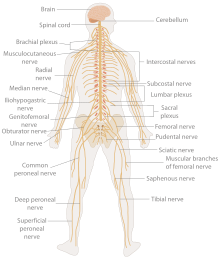Nervous system



The nervous system is a body system which sends signals around the body. It lets animals respond to what is around them. The central nervous system is the brain and the spinal cord.[1] It is present in almost all animals. It is there to process the input from the senses, and to coordinate movement.[2] Neuroscience is the scientific study of the nervous system.
The nervous system is made up of neurons. Other cells, such as glial cells keep the neurons safe and healthy.[3]
The structure of the system includes the brain and spinal cord, which together are called the central nervous system.[2] The brain has billions of nerve cells to help think, walk, and breathe.[4] The nervous system can react in 1/100 of a second to a stimulus, like a pain signal.[4]
The system of nerves in your body that sends messages for controlling movement and feeling between the brain and the other parts of the body anatomy of nervous systems can be sub-divided as follows:[2][5]
References
[change | change source]- ↑ "Organization of the Nervous System". Cancer.gov. National Cancer Institute. Retrieved January 20, 2016.
- ↑ 2.0 2.1 2.2 Kandel ER, Schwartz JH, Jessel TM (2000). "Ch. 17: The anatomical organization of the central nervous system". Principles of Neural Science. McGraw-Hill Professional. ISBN 978-0-8385-7701-1.
{{cite book}}: CS1 maint: multiple names: authors list (link) - ↑ Allen NJ, Barres BA (2009). "Neuroscience: Glia - more than just brain glue". Nature. 457 (7230): 675–7. Bibcode:2009Natur.457..675A. doi:10.1038/457675a. PMID 19194443. S2CID 205044137.
- ↑ 4.0 4.1 Kandel ER, Schwartz JH, Jessel TM (2000). "Ch. 2: Nerve cells and behavior". Principles of Neural Science. McGraw-Hill Professional. ISBN 978-0-8385-7701-1.
{{cite book}}: CS1 maint: multiple names: authors list (link) - ↑ "The Peripheral Nervous System". Cancer.gov. National Cancer Institute. Retrieved January 20, 2016.